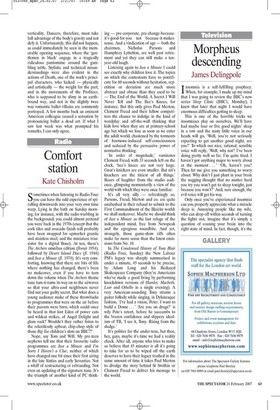Comfort station
Kate Chisholm Sometimes when listening to Radio Four you can have the odd experience of spiralling downwards into your very own time warp. Lying in the bath on Sunday morning, for instance, with the radio warbling in the background, you could almost pretend you were back in the 1970s (except that the cork tiles and avocado finish will probably have been swapped for upmarket granite and stainless steel, and the miniature transistor for a digital Bose). At ten, there's The Archers omnibus edition (flontit 1954), followed by Desert Island Discs ( f l. 1944) and Just a Minute (fl. 1974). It's very comforting, knowing that there are bits of life where nothing has changed, there's been no makeover, even if you have to turn down the volume when The Archers theme tune tum-ti-tums its way on to the airwaves so that your ultra-cool neighbours never find out your guilty secret. But what does a young audience make of these throwbacks to programmes that were on the air before their parents were born, which could once be heard in that lost Eden of power cuts and wildcat strikes, of Angel Delight and glam rock? Wouldn't they rather listen to the relentlessly upbeat, chip-chop style of those Big Toe children's slots on BBC7?
Nope, say Tom and Will. My pre-teen nephews tell me that their favourite radio programmes are Just a Minute and I'm Sorry I Haven't a Clue, neither of which have changed one bit since their first airing in the late Sixties and early Seventies. Not a whiff of restructuring or rebranding. Not even an updating of the signature tune. It's the triumph of another kind of PC thinking — pre-corporate, pre-change-becauseit's-good-for-you not because-it-makessense. And a vindication of age — both the chairmen, Nicholas Parsons and Humphrey Lyttelton, are well past retirement and yet they can still make a tenyear-old laugh.
Listening again to Just a Minute I could see exactly why children love it. The topics on which the contestants have to pontificate for 60 seconds without hesitation, repetition or deviation are much more abstract and obtuse than they used to be — The End of the World, A Secret I Will Never Tell and The Bee's Knees, for instance. But this only gives Paul Merton, Clement Freud and their fellow competitors the chance to indulge in the kind of wordplay and off-the-wall thinking that kids love when they are at primary-school age but which we lose as soon as we enter the adult world, chastened by the torments of hormone-induced self-consciousness and seduced by the persuasive power of normative thinking.
'In order of magnitude,' ruminates Clement Freud, with 33 seconds left on the clock, `bee's knees are not very large. Gnat's knickers are even smaller. But nit's knackers are the tiniest of all things.' Roars of laughter from the studio audience, glimpsing momentarily a view of the world with which they were once familiar.
It's all very silly — refreshingly so. Parsons, Freud, Merton and co. are quite unabashed in their refusal to submit to the First Commandment of the Blairite world: we shall makeover. Maybe we should think of Just a Minute as the last refuge of the independent mind, free from Newspeak and the egregious soundbite. And yet, strangely, those game-show riffs often make far more sense than the latest emissions from No. 10.
In The Condensed History of Tony Blair (Radio Four, Sunday) the New Labour PM's legacy was sharply summarised in under a minute, 45 seconds to be precise, by Adam Long and his Reduced Shakespeare Company (they're Americans who've made a good living by performing knockdown versions of Hamlet, Macbeth, Lear and Othello in a single evening). A very American-sounding Tony strums a guitar folksily while singing, in Dylanesque fashion, 'I've had a vision, Peter. I want to build a Dome ... ' 'Are you on drugs?' is wily Pete's retort, before he succumbs to the brazen confidence and slippery idealism of TB, 'I see it, Tony. Rising from the sludge.'
It's politics for the under-tens, but then, hey, guys, maybe it's time we had a reality check. After all, anyone who tries to make us believe that 45 minutes is all it's going to take for us to be wiped off the earth deserves to have their legacy trashed in the same amount of time it takes Paul Merton to divulge the story behind St Swithin or Clement Freud to deliver his message to the world.






















































 Previous page
Previous page